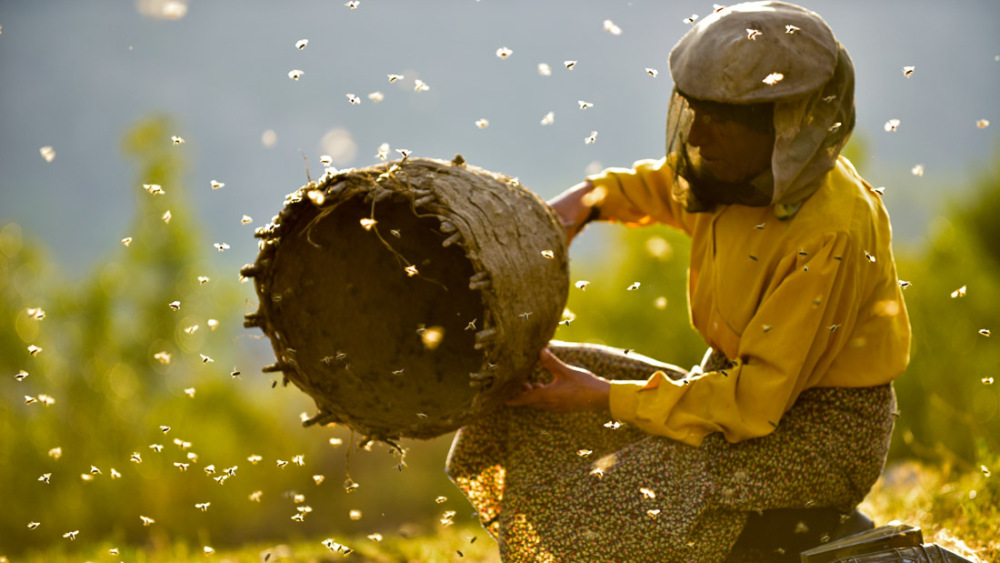
All photos are copyrighted and may be used by press only for the purpose of news or editorial coverage of Sundance Institute programs. Photos must be accompanied by a credit to the photographer and/or ‘Courtesy of Sundance Institute.’ Unauthorized use, alteration, reproduction or sale of logos and/or photos is strictly prohibited.
HONEYLAND
Neon
Reviewed for Shockya.com & BigAppleReviews.net linked from Rotten Tomatoes by: Harvey Karten
Director: Tamara Kotevsky, Ljubomir Stefanov
Screenwriter: Tamara Kotevsky, Ljubomir Stefanov
Cast: Hatidze Muratova, Nazife, Hussein Sam, Ljutvie Sam, Mustafa Sam
Screened at: Dolby 24, NYC, 7/9/19
Opens: July 26, 2019
The Pennsylvania Dutch living in and around Lancaster, Pennsylvania, have a life style that most of us consider strange. In fact their land is a tourist attraction that has captivated Americans wanting to look at a group different from the typical bourgeois resident of our country, given that the Dutch (actually Deutsch) voluntarily live without automobiles, televisions, even electricity. But compared to the principal character in Tamara Kotevsky and Ljubomir Stefanov’s documentary, a film that happily avoids the structure of talking heads and interviewers, these Pennsylvania folks are living in Trump Tower. Filmed over a three-year period with Fejmi Daut and Samir Ljuna lensing as though they were making a National Geographic nature study, “Honeyland” takes us to a remote, mountainous region in the Republic of North Macedonia, where life is anything but milk and honey. Yet Hatidze Muratova, in her mid-fifties, appears to have chosen her way of living despite the call of Macedonia’s capital, Skopje, shunning the rest of the world and involved herself in the support of her eighty-five year old mother, earning her living by nurturing hundreds of wild bees in the making of honey. The film begins as a study of a woman living in harmony with nature and concludes with a scathing criticism of capitalism. Most of all, though, “Honeyland” is a study of the only woman in the entire European continent who lives in this style, and we leave the theater wondering how this kind of life can be of interest to even a single person.
Hatidze Muratova, who allowed the directors and photographers to be flies in the wall, lives in a broken-down shack without electricity and therefore without TV or even an outhouse, with the company of only her sick mother, Jacky the dog, and one cat. She would remove a stone from a hill housing hundreds of bees, take half of the produced honey at one time, and leave the other half for the insects. In this way, by sharing, she expects that the bees will always produce enough for her to live on. She makes the long journey to Skopje on market day to sell the product, insists that this is not junk honey but prepared without chemical pollutants, and therefore deserves a decent price in euros. Hatidze could have chosen to take on a booth in the outdoor market, but she is committed to her mother, who never leaves the shack, who is ill but who understands that she is, as she admits, as static in her bed-bound life as a tree. It’s remarkable how Hatitze can go on, coaxing her mother to eat something, telling her that she must exercise at least to the extent of extending her leg, but regularly gets the reply from the old lady that she cannot do even that.
Hatidze likes to sing, using her affection for song to encourage the bees as she removes the stone exposing the helpful insects who rarely bite their caretaker though she has little protection from a netting costume. She finds that she cannot stay isolated for long. A noisy neighbor arrives with a bounty of kids from babies to teens and a bunch of cattle with which they travel. Instead of sinking more into her isolation, Hatidze plays with the kids, chats with Hussein Sam, the father, advising the entrepreneur wanting to start his own bee business to take only half the honey each time he’d collect his harvest. But Hussein Sam, a Turk like Hatidze, is like an American capitalist, wanting immediate returns, impatient to give the business time to prosper. In return, even the bees revolt, stinging him and the kids repeatedly.
From the satirical part of the movie, we see a universality. The region is as remote in Europe as you can get, yet the theme involves the trampling of nature by the corporation, a level of greed that will destroy not only the natural habitat but sink the business as well. Ultimately the new settler’s rush to profits will destroy not only his own business but that of the nurturing Hatidze.
There is considerable originality here, a look at the last woman alive who conducts her business as does Hitidze. We try to figure out why she is doing this, and even a teenage boy asks, “Why don’t you leave this place?” Hitidze has no answer, treating the question as merely rhetorical, but this is the question that everyone in the movie theater will be asking as well.
The film, in the Turkish language with English subtitles (some with misspellings), played at Sundance and at the Sarajevo Film Festival among other locations.
85 minutes. © 2019 by Harvey Karten, Member, New York Film Critics Online
Story – B+
Acting – A-
Technical – A-
Overall – B+
